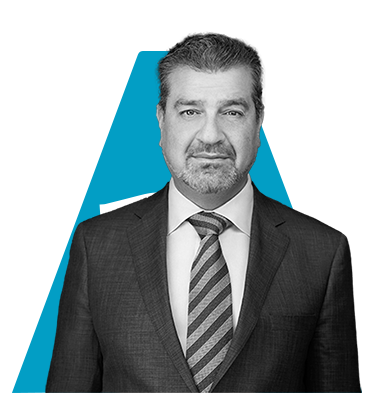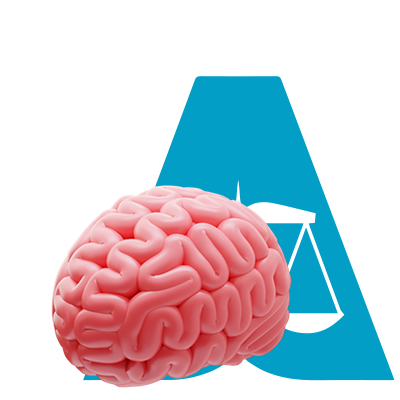Alberta Brain Injury Lawyers
A traumatic brain injury resulting from a car accident can have far-reaching consequences, affecting communication, emotional regulation, concentration, and bodily functions.
Please schedule a free consultation to discuss your TBI or head injury case with an Assiff Law attorney.
Our Brain Injury Attorneys fight for your rights after an accident.
While seeking medical attention and understanding the injuries sustained in an accident, contacting a TBI lawyer may seem unnecessary. However, the financial impact of a brain injury can be severe, with costs reaching hundreds of thousands of dollars for medical bills, lost wages, and rehabilitation.

Settling with an insurance company without legal guidance may lead to accepting compensation which may be far too low, as the full extent of TBI effects may not be visible for several months. Accepting a settlement waives the right to sue, which will prevent you from pursuing justice once the medical bills and other costs related to your injury start to spiral.
A brain injury lawyer can provide valuable leverage and utilize negotiation tactics while understanding the evidence required to prove your case and secure fair compensation from insurance companies.
Hiring a lawyer is not an attempt to take advantage of the system but a means to ensure just treatment by insurance companies focused on profits.
Alberta Brain Injuries & Info
In Alberta, Canada, brain injuries are a significant health concern. According to the Brain Injury Association of Canada, approximately 160,000 Canadians sustain brain injuries each year, and around 18,000 of these injuries occur in Alberta alone. The effects of brain injuries can range from mild to severe and may include physical, cognitive, and emotional impairments.

Causes of Brain Injuries
Sometimes brain injuries may present themselves without symptoms and can arise from various causes and circumstances, not all obvious.
If you or a loved one suffered one of the following accidents, please make sure to contact a medical professional as soon as possible to establish whether you suffered a brain injury.
- Car Accidents
- Motorcycle Accidents
- Bicycle Accidents
- Pedestrian Accidents
- Bus Accidents
- Truck Accidents
- Concussions
- Sports Accidents
- Assault
Types of Brain Injuries
Traumatic brain injury (TBI)
This type of brain injury is caused by an external force, such as a blow to the head, a fall, or a motor vehicle accident. TBIs can range from mild, such as a concussion, to severe, resulting in long-term or permanent cognitive, physical, and emotional impairments. In personal injury cases, TBIs are often caused by another party’s negligence or intentional actions, such as motor vehicle accidents, slip and fall accidents, or assaults. Victims of TBI caused by another party’s actions may be entitled to compensation for damages such as medical bills, lost wages, and pain and suffering.
Acquired brain injury (ABI)
This type of brain injury is caused by internal factors such as lack of oxygen, infection, or stroke. ABIs can also range from mild to severe and can have long-term effects on cognitive, physical, and emotional functioning. In personal injury cases, ABIs may be caused by medical malpractice, such as errors during surgery, anesthesia complications, or delayed diagnosis of a medical condition. Victims of ABI caused by another party’s negligence or medical malpractice may be entitled to compensation for damages such as medical bills, lost wages, and pain and suffering.
Closed head injury
This type of brain injury occurs when the brain is damaged without any visible injury to the head. It can result from sudden acceleration or deceleration of the head, as in whiplash or shaken baby syndrome. Closed head injuries can cause mild to severe symptoms and can have long-term effects on cognitive, physical, and emotional functioning. In personal injury cases, closed head injuries may be caused by motor vehicle accidents, sports-related accidents, or physical abuse. Victims of closed head injuries caused by another party’s actions may be entitled to compensation for damages such as medical bills, lost wages, and pain and suffering.
Penetrating brain injury
This type of brain injury occurs when an object penetrates the skull and damages the brain. Penetrating brain injuries can result from violent crimes, accidents involving sharp objects, or gunshot wounds. These injuries can range from mild to severe, depending on the location of the injury and the extent of damage to the brain tissue. Penetrating brain injuries caused by another party’s negligence or intentional actions can be the basis for a personal injury lawsuit.
Anoxic brain injury
This type of brain injury occurs when the brain is deprived of oxygen for an extended period, such as in cases of near-drowning or cardiac arrest. Anoxic brain injuries can result in permanent brain damage and may cause physical and cognitive impairments. In personal injury cases, anoxic brain injuries may occur due to medical malpractice, such as improper anesthesia administration or failure to monitor the patient’s breathing.
Hypoxic brain injury
This type of brain injury occurs when the brain is partially deprived of oxygen, often due to a stroke or a heart attack. Hypoxic brain injuries can cause long-term cognitive, physical, and emotional impairments. In personal injury cases, hypoxic brain injuries may occur due to medical malpractice, such as misdiagnosis, delayed treatment, or improper treatment.
Toxic brain injury
This type of brain injury is caused by exposure to harmful chemicals or substances, such as lead or carbon monoxide. Toxic brain injuries can cause permanent brain damage, cognitive impairments, and physical symptoms. In personal injury cases, toxic brain injuries may occur due to exposure to toxic substances in the workplace, such as asbestos or chemicals, or due to exposure to toxic substances in the environment, such as contaminated water or air.
These types of brain injuries can be the basis for legal claims if they are caused by the negligence or intentional actions of another party.
If you or someone you know has suffered a brain injury due to the fault of another party, consult with an Assiff Law brain injury lawyer to discuss legal options.
Symptoms of Brain Injuries
While the initial symptoms of a brain injury can be challenging to overcome, many, especially insurance companies, tend to discount the longe-term symptoms that may set in and permanently affect your quality of life.
Short Term Brain Injury Symptoms
- Loss of consciousness
- Headache (mild to severe)
- Nausea and vomiting
- Dizziness
- Confusion
- Memory loss
- Fatigue
- Sensory problems - Changes in vision, hearing or taste
- Speech problems - trouble speaking and understanding speech
- Seizures
Long Term Brain Injury Symptoms
These symptoms may be different from person to person and may develop days months and sometimes years after a brain injury.
Cognitive impairments
You may experience long-term cognitive impairments, such as difficulty with memory, attention, concentration, problem-solving, and decision-making.
Emotional and behavioural changes
You may experience mood changes, such as depression, anxiety, irritability, aggression, or impulsivity.
Physical impairments
You may experience long-term physical impairments, such as weakness, paralysis, spasticity, or tremors.
Sensory problems
You may experience long-term changes in vision, hearing, or other senses.
Speech and language difficulties
You may have long-term speech and language difficulties, such as trouble with speaking, understanding, or reading.
Seizures
You may experience seizures or epilepsy as a result of a brain injury.
Chronic pain
You may experience long-term chronic pain, which can result from the injury itself or from other physical conditions that may have resulted from the injury.
Fatigue and sleep problems
You may experience long-term fatigue and sleep problems, such as insomnia or sleep apnea.
Social and interpersonal problems
You may experience long-term social and interpersonal problems, such as difficulty with communication, relationships, or employment.
Brain Injury FAQ
How is a brain injury diagnosed?
A brain injury is typically diagnosed through a physical and neurological examination, imaging tests, and cognitive tests.
What is the difference between a concussion and a more severe brain injury?
A concussion is a mild traumatic brain injury, while a more severe brain injury can cause more long-lasting effects on cognitive, physical, and emotional functioning.
Can brain injuries cause long-term mental health issues, such as depression and anxiety?
Yes, brain injuries can cause long-term mental health issues, and it’s important to seek medical attention if you experience any symptoms of depression, anxiety, or other mental health issues after a brain injury.
Can a person have a brain injury without showing any visible symptoms?
Yes, a person can have a brain injury without showing any visible symptoms. It’s important to seek medical attention if you experience any symptoms after a head injury, even if there are no visible signs of injury.
How long does it take to recover from a brain injury?
Recovery time can vary depending on the severity and type of injury. It’s important to follow medical advice and treatment plans and to be patient with the recovery process.
What is post-concussion syndrome?
Post-concussion syndrome is a set of symptoms that may occur after a concussion, such as headache, dizziness, fatigue, and difficulty with concentration and memory.
How does a brain injury affect a person's ability to work?
A brain injury can affect a person’s ability to work, depending on the severity and type of injury. It’s important to consult with a medical professional and an attorney to understand your legal options and rights.
Can a person with a brain injury drive?
It depends on the severity and type of injury. In some cases, a person with a brain injury may need to undergo medical evaluation to determine if they are able to drive safely.
How can family members help a loved one with a brain injury?
Family members can offer emotional support, assist with medical appointments and treatment plans, and help with daily tasks, such as cooking and cleaning.
What legal options are available for someone who has suffered a brain injury due to another party's negligence or intentional actions?
Legal options may include filing a personal injury lawsuit to seek compensation for damages, such as medical bills, lost wages, and pain and suffering. Contact an Assiff Law brain injury lawyer for a free consultation today.
Personal Injury Process
What Should I expect?
When you call Assiff Law injury lawyers, we immediately work on recovering compensation for your injuries.

Consult with an Edmonton Injury Lawyer
The first step is to speak with an experienced personal injury lawyer near you.
Our lawyers will review the details of your situation and your understanding of events — your side of the story — so we can determine whether there is any basis for a lawsuit. Then, once you’re ready to move forward, we’ll help you develop a strategy for pursuing compensation.
If we take your case, the process may look something like this:
Gather Evidence
A thorough investigation is the foundation of every case we take on. We use police reports, medical reports, and eyewitnesses’ statements to get to the bottom of things.
Send a Demand Letter
We’ll write a demand letter to the individual responsible for the accident, and their insurance company. We consider the entire financial impact of the situation, including provisions for future medical bills, lost wages, and other related costs.
File a personal injury lawsuit
When an insurance company refuses to offer an acceptable settlement, we gain leverage by filing a lawsuit on your behalf. In addition, filing a lawsuit will provide us access to additional information from the defendants that we otherwise wouldn’t have access to.
Discovery
After filing the suit, we can ask defendants for information that they might have been hesitant to provide. We can use these requests for admissions, interrogatories, and requests for production of documents to learn what evidence they have to support their claims.
Mediation
Once both parties have looked at the facts of the situation, we can schedule a mediation to help resolve the dispute. This gives us the chance to present our side of the story to the defendant’s attorney, and negotiate a fair resolution.
Settlement
If we’re able to reach an agreement prior to the start of the lawsuit, then we’ve reached a settlement. A settlement should take into account all past and future medical bills, lost wages, pain and suffering, etc., and will be paid out in one lump sum in return for you dropping the case.
Personal Injury Trial
If we are unable to settle for a fair amount, we go to trial. During the trial we present your case, employing the evidence we uncovered during discovery and present any expert testimony.
Appeal
What if the jury finds against you? If some sort of legal mistake was made by the defense team or the judge, we might choose to appeal. We would likely have to provide additional evidence and legal arguments in support of our position. If we were successful, the judge could overturn the previous ruling, or require another round of trials.
When you're hurting, We care.
We care. We understand, with our years of experience, what victims of accidents go through—from the obvious physical injuries to the impact they have on your day-to-day life, your job, your family and your overall well-being.
5.0
Awards & accolades.
The acknowledgement of our Edmonton personal injury lawyers have earned us multiple awards for the work we’ve done for thousands of clients. Best Lawyers, Canadian Lawyer Magazine and Consumers Choice have all awarded us for excellence in the field of personal injury law.
Free Consultation
Let's Get Started
We’re ready to fight for you. We’re ready to get you the justice you deserver. And we’re ready to start right now.